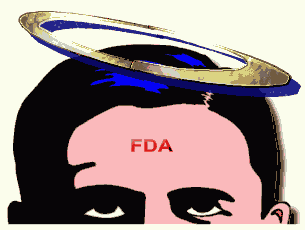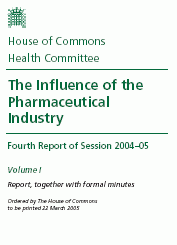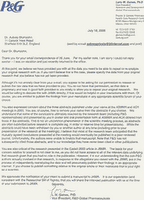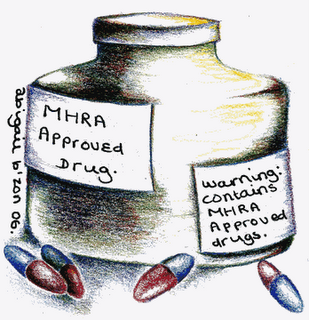It's all down to money
Alternative MP3 player and download here.
Conversation Eastell and Blumsohn 10 September 2003
Blumsohn: So far as the plenary poster if we go through all the things I said I would be comfortable with that.
Eastell: Mmm
Blumsohn: ... and for the other poster I am comfortable with the poster but I have still never seen the data... which to give an oral presentation at the ACR meeting I would find a difficult thing to do.
Eastell: The only thing that we have to watch all the time is our relationship with P&G. Because we are ... because we have the big Sheffield Centre Grant [from P&G] which is a good source of income, we have got to really watch it. So.... the reason why I worry is the network within P&G is like lightening. So if Ian is unhappy it goes to Arkadi, it goes from Arkadi to Nora and before we know it, there is an issue, there is a problem... and it has to be addressed and so forth. and so I was getting worried that the whole thing might be activated and that would affect our relationship.
Earlier|Later|Main Page
About all manner of pharmaceutical scientific misconduct, bad science, and related curious incidents. If you're not outraged, you're not paying attention.
Tuesday, July 25, 2006
Wednesday, July 19, 2006
The FDA "halo effect" : Going, going, gone....
 An important bit of research carried out by Chicago-based legal consulting firm Zagnoli McEvoy Foley (ZMF) is published this week in the National Law Journal. The research indicates that the "FDA's positive halo effect which benefited pharmaceutical companies at trial" is all but gone (Jurors' view of FDA has soured in recent years - subscription only).
An important bit of research carried out by Chicago-based legal consulting firm Zagnoli McEvoy Foley (ZMF) is published this week in the National Law Journal. The research indicates that the "FDA's positive halo effect which benefited pharmaceutical companies at trial" is all but gone (Jurors' view of FDA has soured in recent years - subscription only).A 2006 nationwide survey of 404 jury-eligible Americans showed that less than one-third held a positive perception of the FDA. Earlier surveys had shown that "FDA approval could absolve a pharmaceutical company of guilt in a juror's eyes, as a result of the "rubbing off" of the FDA's perceived credibility". Now that's the important bit - the FDA is no longer effective at absolving companies from corporate criminality.
So what to do......
Well make it impossible for anyone to bring legal action against a drug manufacturer for harm caused by one of its products - so long as that product has FDA approval - even in cases of scientific fraud, the concealing of data, misrepresentation of data, or breaches of scientific procedure by the company (FDA regulations make it harder to sue drug companies).
"Beginning at the end of this month, the new regulations would pre-empt nearly all action by patients in state courts against drug manufacturers for unanticipated injuries resulting from the use of their products. This immunity would apply even if a company failed to warn prescribers or patients adequately about a known risk, unless a patient could prove that the company intentionally committed fraud—a very hard test to meet,"
Be scared. Be very very scared.
Earlier|Later|Main Page
Tuesday, July 18, 2006
Holding response Dr Games about Procter and Gamble research misconduct
Backstory here
To: Aubrey Blumsohn
Subject: Re: Sheffield Actonel Studies Publication
From: games.lm@pg.com
Date: Mon, 17 Jul 2006 08:40:35 -0400
Dr. Blumsohn,
We will get back to you this week about your e:mail of June 26.
Unfortunately, I was on vacation between June 21 and July 11 in Europe and was in the process of switching administrative assistants, so your e:mail did not reach me until last week. Sorry if this has inconvenienced you in any way.
Larry Games
Earlier|Later|Main Page
To: Aubrey Blumsohn
Subject: Re: Sheffield Actonel Studies Publication
From: games.lm@pg.com
Date: Mon, 17 Jul 2006 08:40:35 -0400
Dr. Blumsohn,
We will get back to you this week about your e:mail of June 26.
Unfortunately, I was on vacation between June 21 and July 11 in Europe and was in the process of switching administrative assistants, so your e:mail did not reach me until last week. Sorry if this has inconvenienced you in any way.
Larry Games
Earlier|Later|Main Page
Sir William Osler on pharmaceutical pseudo-science
 "Far too large a section of the treatment of disease is to-day controlled by the big manufacturing pharmacists, who have enslaved us in a plausible pseudo-science...
"Far too large a section of the treatment of disease is to-day controlled by the big manufacturing pharmacists, who have enslaved us in a plausible pseudo-science...The blind faith which some men have in medicines illustrates too often the greatest of all human capacities - the capacity for self deception...
Some one will say, Is this all your science has to tell us? Is this the outcome of decades of good clinical work, of patient study of the disease, of anxious trial in such good faith of so many drugs? Give us back the childlike trust of the fathers in antimony and in the lancet rather than this cold nihilism. Not at all! Let us accept the truth, however unpleasant it may be, and with the death rate staring us in the face, let us not be deceived with vain fancies...
We need a stern, iconoclastic spirit which leads, not to nihilism, but to an active skepticism - not the passive skepticism, born of despair, but the active skepticism born of a knowledge"
Sir William Osler (1849 - 1919) to the Ontario Medical Association in June 1909
Earlier|Later|Main Page
Monday, July 17, 2006
An open letter to Dr Games about Procter and Gamble research misconduct
Dr Larry M Games
Vice President
Procter and Gamble Pharmaceuticals
Health Care Research Center
8700 Mason-Montgomery Road
Mason, Ohio, 45040
USA
17 July 2006
Dear Dr Games
Re: Actonel Studies / Sheffield Situation
In view of Procter and Gamble's stated intent to now deal with this matter in an open and honest fashion, I am writing to express concern that I have received neither acknowledgement of nor reply to recent correspondences.
My last communication of 26 June 2006 is repeated on the following page for your convenience. Points 1-3 and point 6 required no response. However points 4 and 5 were requests for further information. In particular, although I am happy that P&G has now provided the main data underlying material presented
in my name, I remain concerned over the failure to provide confounding variables and information about non-vertebral fracture.
Clearly these publications (one full paper and three meeting abstracts) have to be retracted.
The correct findings (per the two draft publications already written in my name, but with corrected results) have to be published.
I would appreciate a response at your earliest convenience.
Yours sincerely
Dr Aubrey Blumsohn
MBBCh, BSc (hons), MSc, PhD, MRCPath
[Previous correspondence]
Dr Larry M Games
Vice President
Procter and Gamble Pharmaceuticals
Health Care Research Center
8700 Mason-Montgomery Road
Mason, Ohio, 45040
USA
26 June 2006
Re: Sheffield scenario
Dear Dr Games,
1) Per my last letter/request I am writing to confirm that Professor ------------- and Professor ------------- have been involved in statistical analysis.
2) The interpretation of data previously presented in the Eastell 2003 paper, meeting abstracts presented in my name, and two draft publications intended for submission (with me as first author) cannot be sustained (using any of a variety of relevant statistical methodologies, including simple visual inspection).
2) Professor ------------- has agreed to coauthor the publication, with intent to submit to JAMA. Clearly other involved parties may wish to coauthor. I will forward the manuscript when complete.
3) I have requested (and received) permission from the Journal of Bone and Mineral Research to reproduce Figure 1 of the Eastell JBMR 2003 paper a) as it stands, and b) with overlying data and data analysis, c) on a website.
4) Under the circumstances I would wish to submit via JAMA the raw data underlying the intended manuscript, and for this to be made publicly available. I request your permission to do so, since this relates only to data generated in Sheffield in a subset of the VERT and Hip trials (with accompanying randomisation and fracture codes) I trust that this will be satisfactory.
5) I note that data relating to the two key confounding variables (as previously requested) has not been provided. I would appreciate it if you would reconsider this. Please note my email of the 7th of April with regard to these.
6) I will be making a separate evidence based submission to JBMR with regard only to the procedure in these studies along the lines of my current meeting presentations.
Yours Sincerely
Dr Aubrey Blumsohn
Sheffield
Earlier|Later|Main Page
The freedom to say that 2 plus 2 make 4

"Freedom is the freedom to say that two plus two make four. If that is granted, all else follows."
(George Orwell, 1984)
George Orwell's 1984 nightmare has become reality in pharmaceutical medicine. Industry selected academic "thought leaders" and government bureaucrats have become faceless drones for industry -- stripped of any ability to speak the truth.
Government agencies established to "Safeguard Public Health" (such as the MHRA and the FDA) increasingly resemble Orwell's "Ministry of Truth" (the bureaucracy responsible for perpetually revising historical documents). They routinely ignore violations of the usual safeguards of science (such as access of scientific authors to unmanipulated raw data), turn a blind eye to scientific fraud, have attempted to enact laws to protect pharmaceutical companies against litigation, and respond to probing questions with meaningless gobbledegook.
"We could make no greater mistake than to be lulled into a sense of false security by believing that some disembodied force called the government will act like a beneficent big brother and make certain that the special interests will not predominate. If the general welfare is to be protected, it will be protected by the actions of people, not the government."
-Dr. A. DALE CONSOLE, former medical director for drug giant ER Squibb (as quoted in Peretz Glazer and Migdal Glazer, ISBN 0465-09173-3)
This blog will serve to articulate these problems through a detailed personal travelogue involving dubious "collaborative" research with Procter and Gamble Pharmaceuticals in Sheffield. More importantly, it is about multifaceted and ham-handed attempts to suppress research misconduct, and about the responsibility of individuals to speak honestly and openly about matters of public interest.
"During times of universal deceit, telling the truth
becomes a revolutionary act."
George Orwell
You have to be an intellectual to believe such nonsense. No ordinary man could be such a fool.
George Orwell
Sometimes the first duty of intelligent men is the restatement of the obvious.
George Orwell
Earlier|Later|Main Page
Wednesday, July 12, 2006
Academic Freedom versus Pharmaceutical Fraud
Public relations versus public interest
 This blogger wonders why Ketchum, a public relations company had 375 hits on this blog? Watch this space.
This blogger wonders why Ketchum, a public relations company had 375 hits on this blog? Watch this space."Ketchum’s European presence covers all major commercial, political and media centers and regionally services Kodak, Procter and Gamble, Roche, Whirlpool, Samsonite and FedEx."
http://www.slate.com/id/2133061/
Earlier|Later|Main Page
C.R.E.A.M KnowhatI'msayin?

Pharmaceutical rap.
Cash Rules Everything Around Me (Acronym dictionary)
Legend Of The Wu-Tang: Wu-Tang Clan's Greatest Hits
RCA Records
http://music.msn.com/album/?album=39490547#
Word up, two for fives them niggaz got garbage down the way, word up
KnowhatI'msayin?
(Cash Rules Everything Around Me
C.R.E.A.M. get...)
Yeah, check this ol fly shit out
Word up
(Cash Rules Everything Around Me) Take you on a natural joint
(C.R.E.A.M. get the money) Here we here we go
(dolla dolla bill y'all) Check this shit, yo!
[Chorus -- 4X]
Niggas gots to do what they gotta do, to get a bill
YaknowhatI'msayin?
Cuz we can't just get by no more
Word up, we gotta get over, straight up and down
[Chorus -- 3X]
Cash Rules Everything Around Me
C.R.E.A.M.
get the money
Dolla dolla bill y'aauhhhaaaauhhhhahhhauhhhhll, YEAH
Earlier|Later|Main Page
Tuesday, July 11, 2006
The MHRA : Why is the government not acting?
 The UK Medicine and Healthcare Products Regulatory Agency (MHRA) is widely accused of tying itself into knots trying to accommodate commercial scientific misconduct. Criticisms include failure to properly scrutinise data before licensing drugs (watch this space), and an unhealthy inclination to accept "scientific" reports from companies with blind faith without reviewing or retaining raw data.
The UK Medicine and Healthcare Products Regulatory Agency (MHRA) is widely accused of tying itself into knots trying to accommodate commercial scientific misconduct. Criticisms include failure to properly scrutinise data before licensing drugs (watch this space), and an unhealthy inclination to accept "scientific" reports from companies with blind faith without reviewing or retaining raw data.No meaningful steps have been taken by the UK government to implement critical recommendations of the House of Commons Health Select Committee Report of 2005 despite a barrage of problems (e.g. here).
The key recommendation of the Select Committee Report of 2005 was:
"In view of the failings of the MHRA, we recommend a fundamental review of the organisation."
Yet nothing has happened. Extracts of the report are below:
"practices have developed which act against the public interest." Page 4: The MHRA has failed to adequately scrutinise licensing data .... The organisation has been too close to the industry, a closeness underpinned by common policy objectives, agreed processes, frequent contact, consultation and interchange of staff. We are concerned that a rather lax regime is exacerbated by the MHRA’s need to compete with other European regulators ....
Page 5: The Government, like the MHRA, has tended to assume that all is for the best... Page 30: The MHRA is ...funded entirely by fees derived from services to industry
Page 31: The MHRA relies on company data, presented as a series of detailed assessment reports, in its decision whether or not to licence a drug. Raw data is very rarely analysed.
Page 49: The consent forms do not inform patients that the raw data may be maintained by the industry, not made available to the general public or even reviewed by the regulatory authorities.
Page 52: ... longstanding convention, vigorously upheld by the regulators, whereby clinical trial results were regarded as company property and commercially confidential.
Page 52: Too many problems appear to persist unnoticed or unacknowledged by the organisations that are central to the co-ordination, conduct and review of the clinical trials.
Page 79: The MHRA Chairman suggested that trust underpinned the stance of the MHRA towards the companies they regulate. We inferred that this extended to the routine acceptance of companies’ summaries of the results of tests on their drugs as true reflections of the raw data on which they were based.
Page 79: ..the MHRA is too trusting.
The evidence indicated that the MHRA examined primary (raw) data on drug effects only if it suspected some misrepresentation in the summary data supplied. It was argued that such trust in regulated companies goes too far: reliance on company summaries is neither sufficient nor appropriate, .....Denial of access to information held by the [MHRA] puts the interests of pharmaceutical companies ahead of those of patients and prescribers. This is particularly indefensible in the light of evidence that regulatory agencies, supposedly established to protect the public, are acquiescing in biased later publication of the information they hold.
Page 79: Regulatory inertia was clearly illustrated through publication of the findings of the UK’s first ever public investigation into a drug safety problem:
Page 82: In setting up the review of SSRI antidepressants, the MHRA/CSM responded to another long-standing concern about regulatory activity: the possible conflicts of interest of regulators.
Page 83: user reports of often serious problems had been systematically discounted or ignored.
Page 85: ... the perceived threat by MHRA staff of legal entanglement resulting from regulatory action.. it was very clear that the MRHA officials were very mindful the whole time of that dimension, to my view, more than the dimension of public health and public responsibility
Page 87: Further concerns, relating to the MHRA’s reliance on company summaries of data, rather than raw data are discussed elsewhere.
Page 96: A statement to the effect that heart problems were associated with Celebrex was issued by the MHRA in December 2004. In the statement, the Agency made it clear that it had not seen the actual data from the drug company but that its advice was based on information from Pfizer’s website.
Page 98: The regulatory authority, which is responsible for controlling much of the behaviour of the industry has significant failings. Lack of transparency has played a major part in allowing failings to continue. The traditional secrecy in the drug regulatory process has insulated regulators from the feedback that would otherwise check, test and stimulate their policies and performance. Failure can be measured by the MHRA’s poor history in recognising drug risks, poor communication and lack of public trust. Regulatory secrecy also underpins publication bias, and other unacceptable practices. The closeness that has developed between regulators and companies has deprived the industry of rigorous quality control and audit.
Page 102: Thirdly, procedures for investigating complaints about breaches of regulations are too slow, poorly enforced and weakly sanctioned.
Page 103: The MHRA does not routinely examine raw data submitted with the licence application but is dependent on summaries provided by the applicant. The Expert Working Group on SSRI’s report of December 2004 showed that summaries of information may not provide the detail required to assess drug risks adequately.
Page 106: The MHRA.... is entirely funded by fees from those it regulates.... it competes with other European agencies for fee income... serious weaknesses in the MHRA. Worryingly, in both its written and oral evidence the Agency seemed oblivious to the critical views of outsiders and unable to accept that it had any obvious shortcomings ... The Agency’s attitude to its public health responsibilities suggested some complacency and a lack of requisite competency...
Comment: Having himself dealt with the MHRA, this blogger is waiting patiently for action to safeguard public health and science.
Earlier|Later|Main Page
Monday, July 10, 2006
The important mission of the Food and Drug Administration (FDA)
The failure of the FDA and other drug regulatory bodies such as the MHRA have been discussed elsewhere. The quiet collusion with research misconduct in biomedicine has become increasingly apparent (1, 2, 3, 4, 5).
While medicine is seeing scandals and deaths resulting from misrepresentation of science involving Vioxx and SSRI antidepressants, the FDA has more pressing concerns.

"Dr. Ho's Double Massage" and "Dr. Ho's Muscle Massage," are in violation of a series of Food and Drug Administration (FDA) statues. The case is being investigated by the FDA.
www.fda.gov/bbs/topics/NEWS/2006/NEW01389.html
"Protecting the public against products illegally marketed without FDA approval is an important part of the mission of our agency" stated FDA Acting Commissioner von Eschenbach. "The unapproved claims on products such as these often lead patients to forego proven therapies, which can cause serious health consequences."
Earlier|Later|Main Page
While medicine is seeing scandals and deaths resulting from misrepresentation of science involving Vioxx and SSRI antidepressants, the FDA has more pressing concerns.

"Dr. Ho's Double Massage" and "Dr. Ho's Muscle Massage," are in violation of a series of Food and Drug Administration (FDA) statues. The case is being investigated by the FDA.
www.fda.gov/bbs/topics/NEWS/2006/NEW01389.html
"Protecting the public against products illegally marketed without FDA approval is an important part of the mission of our agency" stated FDA Acting Commissioner von Eschenbach. "The unapproved claims on products such as these often lead patients to forego proven therapies, which can cause serious health consequences."
Earlier|Later|Main Page
'The Drug Trial' by Miriam Shuchman - an exercise in logical fallacy
 Intimidation of researchers and corporate distortion of scientific debate has become part and parcel of pharmaceutical "science". The consequences for patients and for public trust in science have been calamitous. Much thought is required to resolve the crisis. This disappointing book is not part of that debate.
Intimidation of researchers and corporate distortion of scientific debate has become part and parcel of pharmaceutical "science". The consequences for patients and for public trust in science have been calamitous. Much thought is required to resolve the crisis. This disappointing book is not part of that debate.It begins with a story. A researcher, Nancy Olivieri, obtained funding from Apotex to research a drug. She asserted her right (and obligation) as a researcher to publicise findings which she believed to be correct. Apotex and the University of Toronto responded by sacking, threatening and gagging. Properly independent inquiries were held into the way in which Olivieri was treated, each one exonerating her. And she was reinstated.
 Shuchman relies heavily on a spurious form of argument that attempts to give the impression that Olivieri was somehow responsible for the academic freedom debacle.
Shuchman relies heavily on a spurious form of argument that attempts to give the impression that Olivieri was somehow responsible for the academic freedom debacle. Through adept use of the "straw man" fallacy Shuchman ignores the actual ethical problem, and substitutes a distorted and misrepresented version of a different problem. It is an evasion tactic, but on whose behalf? Certainly not on behalf of patients who rely on proper debate in science.
Secondly Shuchman relies on ad hominem attack. Selective and anonymous insulting of Olivieri is not ad hominem - it is simply insult. To make matters worse it has been suggested that much of the gossip Schuchman reports is false. To reject the principles raised by Olivieri based on such personal attack is ad hominem, and no argument at all. One wonders what forces might have motivated Schuchman?
The fallacies are discussed eloquently in the review by Professor David Healy
"Again and again the events are seen through a prism of sympathy for those who have been portrayed elsewhere as the villains ... Take Gideon Koren .......In the midst of this saga, Koren sent a string of anonymous hate mails to Olivieri’s colleagues. ..Koren was disciplined for misconduct in sending the anonymous letters, and in then repeatedly denying responsibility until he was identified as author by DNA evidence. 'His actions were childish, vindictive and dishonest.’ I’ll leave it to the reader to guess how Miriam Shuchman might portray this episode in a manner that generates sympathy for Dr Koren."
"Starting right from the subtitle, The Drug Trial dodges the key issues by claiming that this is a scientific rather than an ethical scandal. If Olivieri got the science wrong, she ipso facto got the ethics wrong ........If it turns out that Apotex’s drug has some benefits for the heart in some patients with thalassemia, as the book suggests, this would no more invalidate the call that Nancy Olivieri made than recent findings that thalidomide is an excellent treatment for leprosy now invalidate the efforts of Siegfried Lenz to raise concerns about its teratogenic effects.... The key issue is whether in the face of ambiguous clinical trial data, a clinician treating patients should err on the side of the patient or on the side of the corporation that hopes to make money out of future patients. Shuchman glides over this..."
In the British Medical Journal Martyn rates the book 1 star and writes:
It is disappointing that Shuchman's book hardly touches on these issues. Instead, it retells the story from a worm's eye view, dwelling on the personalities of the people involved, what they said about each other, who was sleeping with whom, and the tricks they got up to to blacken each other's reputations.
Earlier|Later|Main Page
Sunday, July 09, 2006
Why bother with clinical trials?

Useful statistical methodology for big pharma here:
http://www.datanumerics.com/
See also: The freedom to say that 2 plus 2 make 4
Earlier|Later|Main Page
Saturday, July 08, 2006
Did the MHRA collude with corporate scientific fraud over SSRI's?
Highly possible according to a report this week in the British Medical Journal [Healy, British Medical Journal 2006; 333: 92-95]. An accompanying editorial by BMJ editor Fiona Godlee argues the drug industry is badly regulated, and that companies must be prevented from evaluating their own products.
The question is whether the UK regulators were simply inept or whether they knowingly and deliberately assisted GlaxoSmithKline to deceive clinicians and the public.
"The regulators seem stuck in a world where balancing evidence of potential benefit against actual risk causes real problems"
GSK documents now acknowledge a possible six-fold suicide risk for adults on Paxil:
www.gsk.com/media/paroxetine_adult.htm
www.gsk.com/media/paroxetine/adult_hcp_letter.pdf
A 2003 enquiry by the regulator was halted when it emerged that half the members of the so called "expert group" held shares in GSK.
Earlier|Later|Main Page
The question is whether the UK regulators were simply inept or whether they knowingly and deliberately assisted GlaxoSmithKline to deceive clinicians and the public.
"The regulators seem stuck in a world where balancing evidence of potential benefit against actual risk causes real problems"
GSK documents now acknowledge a possible six-fold suicide risk for adults on Paxil:
www.gsk.com/media/paroxetine_adult.htm
www.gsk.com/media/paroxetine/adult_hcp_letter.pdf
A 2003 enquiry by the regulator was halted when it emerged that half the members of the so called "expert group" held shares in GSK.
"Following the path of least resistance
is what makes rivers and men crooked."
--Unknown
Earlier|Later|Main Page
Wednesday, July 05, 2006
The selective criminalization of research fraud - Eric Poehlman to go to prison
Eric Poehlman to go to prison for scientific misconduct. Assistant U.S. Attorney Steven Kelley told the court:
But is that true? Strange that corporate scientific crimes (and the academics who collude in such crimes) are shielded from criminal prosecution.
Earlier|Later|Main Page
"This is part of a new era when people are taking this kind of conduct more seriously."
But is that true? Strange that corporate scientific crimes (and the academics who collude in such crimes) are shielded from criminal prosecution.
Justice is always violent to the party offending,
for every man is innocent in his own eyes.
Defoe, Daniel
Earlier|Later|Main Page
Subscribe to:
Comments (Atom)


